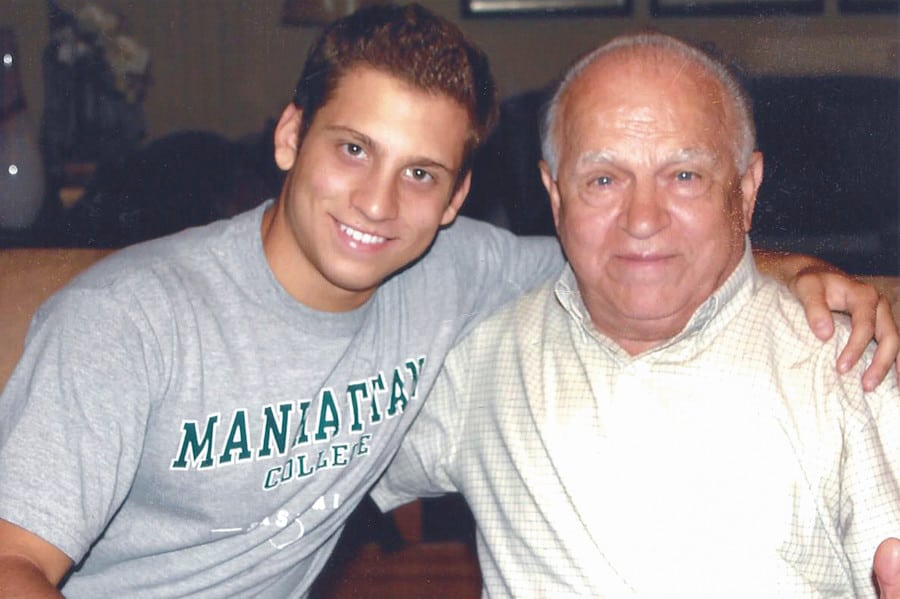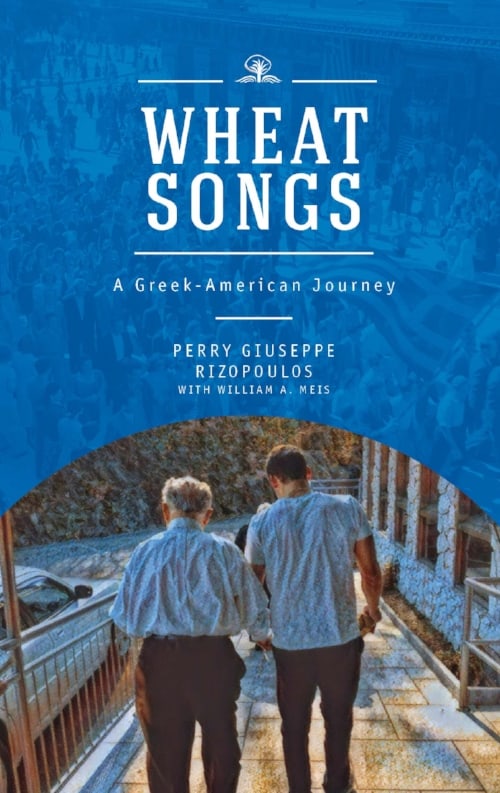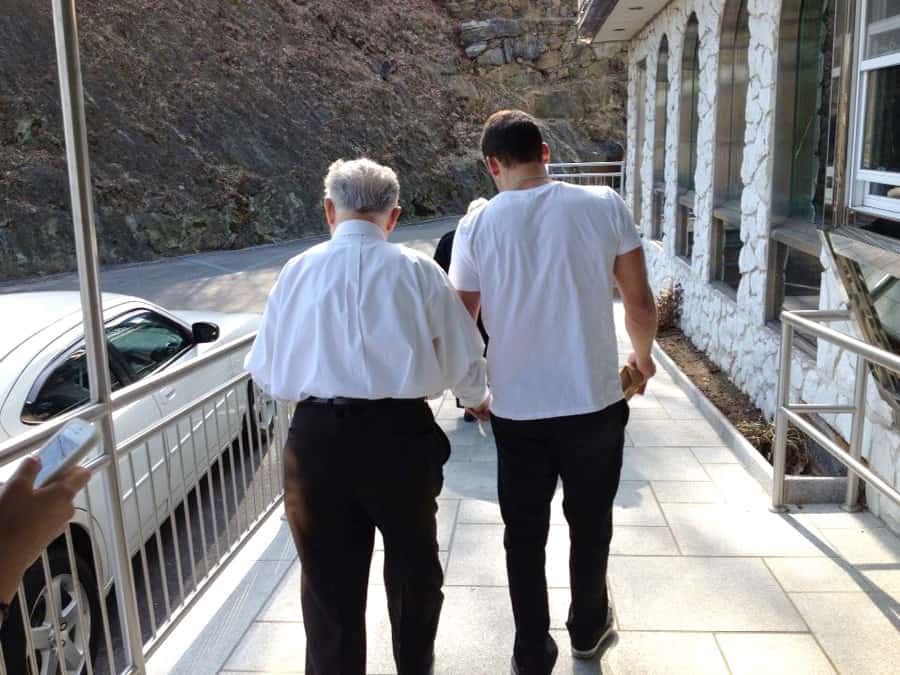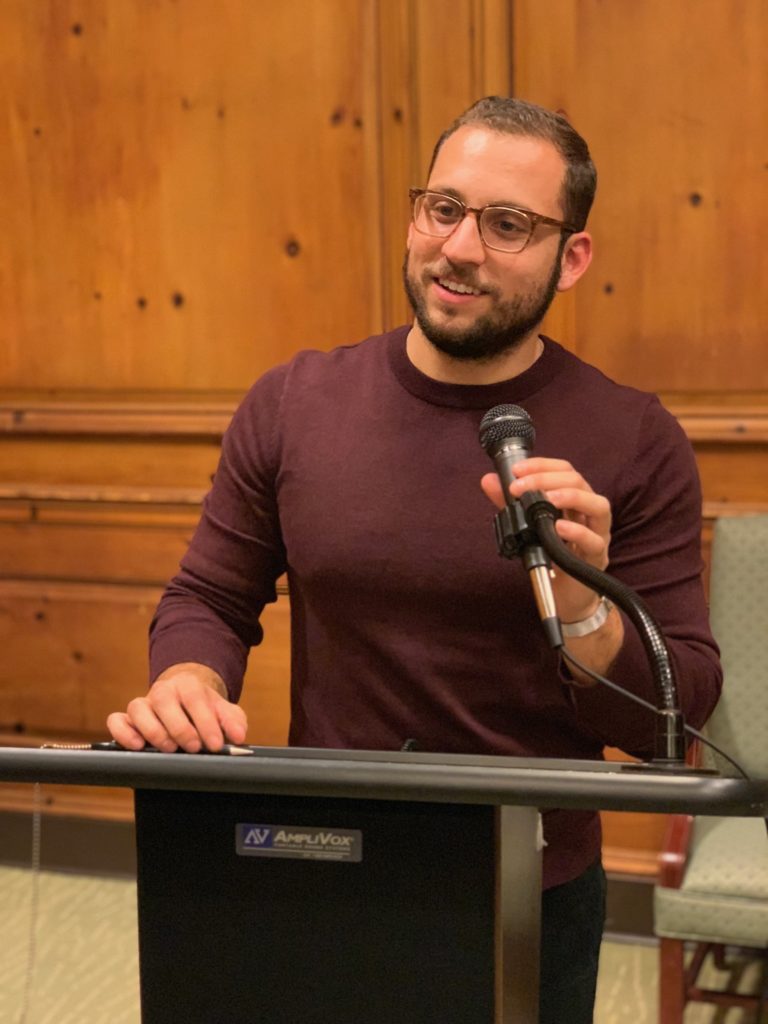In his first class on his first day of graduate school, Perry Rizopoulos’ teacher asked a very important question, “what have you learnt from your grandparents?” and encouraged them to recall a photograph or memory. For Rizopoulos, who has Greek and Italian roots and was born and raised in the Bronx, this question catapulted him back in time when, as an 11-year-old sitting with the cherished grandfather he is named after, Pericles, he was privy to hearing the details of a journal which had captured in vivid detail the harrowing experiences of being captured and surviving Nazi Germany and the Greek Civil War.


This precious journal, kept by his grandfather’s uncle, would form the basis of Rizopoulos’ thesis, the end result being the recently released book Wheat Songs; A Greek-American Journey. And what a journey it has been, both for Pericles who first lived through it, and then relived it by recounting the journal entries to his grandson, as well as for Rizopoulos who went on a philosophical journey reflecting on his grandfather’s stories along with his memories of growing up in a Greek, Italian and American family in the Bronx. Both journeys beautifully immortalised in a memoir which invokes great emotion.
“My pappou, Pericles, would share stories about his past with me throughout my childhood,” says Rizopoulos. “It was not at all uncommon for him to share memories about his life in Greece before WWII and also tell stories of WWII and the Greek Civil War. I would always listen attentively because of the deep love and respect I had for him and also because these stories are genuinely gripping.”
“Our first meetings while working on my master’s degree thesis that would eventually turn into the book were the most formal and purpose-driven discussions we had about his life. We both knew, along with my yiayia, Molly, who was always with us, that this was a project and an opportunity to work and create something.”

Although his health was starting to deteriorate, Pericles showed the same determination, strength, and courage which had seen him through all of his life’s experiences towards ensuring he told all the stories needed to finish the book.
The story that stayed with Rizopoulos the longest after hearing it was the story of Pericles’ and his brother Panayiotis’ capture. “This is the moment in the narrative that truly sends the brothers into the clutches of the Nazi beast and is how the book begins because it was such a gripping retelling by my pappou,” he says.
While a book which documents events of war and survival is going to be laden with sadness there are lighter moments, ones of hope and courage, including when Pericles left Greece for the United States. “My favorite story, however, would be their return to their family in the village after months of being separated and captured,” says Rizopoulos. “The joy my pappou expressed when telling me of their reuniting with their five brothers, mother and father in their totally destroyed village were touching. They were believed to be dead and when they walked through the village their neighbors saw them first and started yelling that they were home. Their brothers ran towards them as their mother fainted into their father’s arms. All nine of them hugged each other in the middle of the village and my pappou described the feeling of peace that came over him when he finally returned to them.”

The concept of family has been an important one in Rizopoulos’ life and the close connections he maintains with his family and his cultural backgrounds are both admirable and sets an example for his generation.
“My Greek and Italian background has played a tremendous role in shaping who I am, and I find inspiration in the culture, music, art, and philosophy of both,” he says. “My mother’s side is Italian, from Bari and my father’s side is Greek, from Kastoria. I speak a little Italian and I speak a little Greek. There are certain phrases in each that have taken on a special meaning in my life because of the ideas they represent. Two major examples that are featured in the book are ’philotimo’ and ’la bella figura,” both of which, for me, represent taking pride in our actions and how we carry ourselves. The religious traditions from both sides have also impacted me. To this day, I wear a crucifix along with il corno, the Italian horn around my neck on separate chains, of course, and pray with a komboskini.”
Rizopoulos is not your average Millenial. A professor of philosophy at Mt Saint Vincent, St John’s University and Manhattan College, he is committed to conveying the importance philosophy can play in our lives and his passion for its teachings infiltrates his prose, including in Wheat Songs, in which each chapter begins with a quote from philosophy and other quotes are woven into the text. Rizopoulos is a firm believer in philosophy as the art of living and as a way of life.
“There were a few events and reflections that led me to pursue philosophy and teaching,” he reminisces. “I was initially undecided in terms of a course of study when I went to college. I took a class with a professor named Dr. Alfred Dilascia, an Italian immigrant, on Aristotle and he made philosophy real, powerful and engaging. That encouraged me to choose the subject as my major and then working with Dr. David Bollert who is an incredible pedagogue and philosopher began the conversation about becoming a teacher.”
A passion for teaching seems to be in the genes. With a mother who is a professor of education and a sister who is a teacher, Rizopoulos quickly fell in love with teaching during his senior year of college while working as a lab assistant for an introductory level Italian course. “I love teaching philosophy and am working to finish my doctorate in Interdisciplinary Studies at Columbia University’s Teachers College within a couple of years,” he says. “My goal is to make philosophy as lucid as possible and to encourage my students to engage with it as a way of flourishing in life. I am a firm believer in philosophy as the art of living and as a way of life.”
Ever the educator, Rizopoulos wants readers to gain an understanding of the significance these events had on Greece and its citizens. “Ultimately, I hope that the book will educate a number of people on Greek history in regard to the Nazi occupation of Greece and the Greek Civil War as these events are not commonly learned about in schools. Also, I hope that it will speak to the importance of dialogue and of maintaining bonds to family, identity and the values that can help us strive and flourish,” he says.
The book is a page turner, hooking in the reader with a setting and storyline to rival that of fiction, and creating a hunger to find out what will happen next. “I am grateful to say that thus far the feedback has been very encouraging,” says Rizopoulos. “A number of people have mentioned that they couldn’t put the book down as it reads like a thriller. Also, people have commented that they didn’t know all of this happened to Greece and that the book has been illuminating from a historical perspective.”
The title Wheat Songs came from Rizopoulos’ great-grandmother Ourania’s habit of singing with his pappou and his brothers while they worked in the fields. When the kids would get tired, she would sing old Greek songs with to lift their spirits and encourage them to carry on. “The idea of her songs is a recurring occurrence in the book whenever my pappou’s spirit is lifted or when he needs to lift it himself. The songs are a source of happiness and strength for him,” explains Rizopoulos.
One can’t help thinking about how proud and moved pappou Pericles was of his grandson. While Pericles passed away in 2016 before the novel was completed, Rizopoulos, poignantly, was able to give him a copy of an early edition to hold in his hands as a Christmas present, a special moment for both.
“There were so many lessons he taught me,” says Rizopoulos. “I would say the most important would be to approach love and work with everything I have and to truly invest and commit to whatever I choose to do in life.”
Wheat Songs; A Greek-American Journey is available on Amazon and online at all other major booksellers

